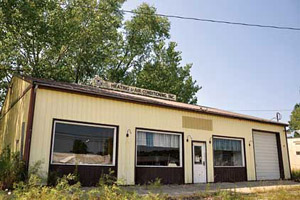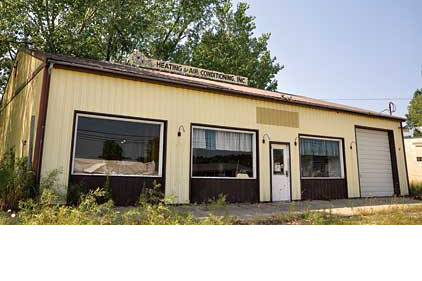
|
| An abandoned HVAC contracting business may be an eyesore to the community, but it can also drive business to other local contractors. |
Small businesses come and go, that’s a given. The sheer volume of business start-ups and failures each year suggest that all sectors of the business community, including the HVAC contracting trade, are affected. Some estimates show that 600,000 businesses start up each year and the majority of them go out of business within five years. That creates a lot of turmoil — or opportunity — for small business owners who see a chance to grab a bigger share of the market as competitors fold their tents.
But are HVAC contractors taking advantage of the misfortunes of others? Some are and some aren’t. There are some interesting stories attached to this topic, like the one about the HVAC contractor who bought some office furniture from a defunct competitor only to find a file cabinet full of customer information. Another business owner hired a former competitor to download service agreement customer files into his own database.
In each case, a small investment made a significant impact on the customer list of each HVAC contractor.
Some Obvious Advantages
One of the “mining techniques” that contractors have used to add new customers from former competitors is to purchase the telephone number of a closed competitor. Former Illinois HVAC contractor Bob Forty said he tried this method a few times with varying degrees of success.
“Getting phone numbers is a little hard to do, unless you know someone or can get the previous owner’s OK,” he said. “I had an insider friend working for the phone company, and he helped me to get the phone number right away. The phone company usually wants to wait for a year to release a company phone number. In both cases, no money was owed to the phone company.
“This worked very well because both defunct firms I got the phone numbers for had a lot of furnace stickers plastered all over the place. In both cases, we ported the numbers to our multi-line phone system so we could see where the calls were coming from. For the first year, most of the calls were service related, which many times translated into replacement calls.
“When I advertised in both towns, starting in the second year, I used my new ‘local’ phone numbers, which helped keep the calls coming in.”
That methodology has worked well for Florida HVAC contractor Dave Hutchins. “I got the phone number for a shop that closed down about two months ago,” he said. “It didn’t cost me anything and I have had numerous calls — even sold one replacement system.”
Hutchins noted that there are several ways to obtain a phone number, including negotiating with the former owner or waiting for the number to become available once the new telephone directory is published, and reserving the number ahead of time. “You may have to wait a year, but it is worth it,” he said. “The $35 monthly cost is easily paid for in one sale.”
Indiana HVAC contractor Brad Cagle said he bought a phone number and had more success than a competitor who bought that same company’s customer list. “I have obtained a phone number, and it has paid off well,” he said. “A competitor obtained the customer list and found he had to market these customers. I have been receiving calls every day from the former customers for two years and building strong relations with them.”
But buying a customer list can be very advantageous, too — particularly if the list contains service agreement customers. These people are locked into a contract and are obligated to get routine service and maintenance.
“In my opinion, the most important items for sale are the agreement customers, and if there are none there is not much of a business to buy,” said Nebraska HVAC contractor Scott Getzschman.
Ohio HVAC contractor Roseann Cyngier agreed. “Consider buying phone numbers but investigate service agreement customers,” she said.
Buying a phone number or customer list is one thing, marketing to that customer base and securing a loyal following is another. South Dakota HVAC contractor Tom Stritecky outlined his plan for reaching out to his new potential customer base after acquiring the list.
“The first thing we did was send out a mailer letting them know that we were there to be their new provider,” Strickety said. “Our second mailer was to offer a special service deal to them. In that mailer we gave them a $25 coupon to use for future service if they filled out a survey with their contact information so we could keep them on the email newsletter. After that, we had our marketing director call everyone that the former business did service for in the past six months and offer them a service agreement. We had a 3 to 5 percent success rate.”
Keeping an Eye on the Competition
Some HVAC contractors do a little “preventive maintenance” of their own, keeping an eye on the local competition and knowing what to do if and when one of them goes out of business. New Mexico HVAC contractor Mike Salmon got to know one local competitor, and it paid off for his business.
“A few years back the owner of a local well-established HVAC company called me looking for a home for some of his service technicians,” Salmon said. “He was downsizing due to the downturn in the economy. We shared the same operating philosophy and held the same dealership level for the equipment we handled, so his personnel were a good fit. We eventually hired one very good technician. Unfortunately, his business eventually shut down entirely.
“In his heyday he had been aggressive in selling extended equipment warranties, which now had no company to support them. Because of our mutual brand affiliation, the distributor called and offered to assign a portion of the list to us, which was a windfall of potential customers for our service department. We immediately contacted them and were successful in winning many over.
“The takeaway is get to know your competitors and keep an open line of communication with them. The second is to conduct your business in such a way that your distributors trust you to look out for their interests, too. Without partnering in the business community, we would not have had access to a solid technician and the valuable customer list that was just given to us.”
Not all methods guarantee instant success or success at all. Some HVAC contractors warn that buying any assets of a closed competitor can be risky because of the reputation of the former business and any associations tied to the business, such as debt collectors or price-shopping customers. In fact, Maine HVAC contractor Paul DeLaiarro doesn’t believe in taking advantage of a business that has closed.
“I personally think that it is a loss for the community, and I would not go out of my way to take that company’s customers by a show of force,” he said. “I would just allow the phone to ring as usual. I guess my heart is in the local end of things.”
Sidebar: When a Competitor Closes
In a recent online poll at Linkedin.com, 75 HVAC contractors responded to the following multiple-choice question: “When a local HVAC contractor (competitor) closes down, what action are you most likely to take?”
• Purchase/obtain old phone number – 39%
• None – 28%
• Purchase/obtain customer list – 19%
• Other – 11%
• Purchase physical assets – 4%
“In the past I have found the customer list of very limited value if they are already going out of business,” said respondent Texas HVAC contractor G. Andrew Smith. “Often they have not paid attention to their business and their customers — which they feel is everyone in the computer, but I consider only maintenance visit customers — have already left. The phone number is often low cost, and anyone that calls it is a very low-cost acquisition if we do our job with outstanding customer service.”
“All of the above or none at all,” said respondent New York HVAC contractor Joe Panagia. “It depends on the situation.”
Publication date: 7/2/2012


Report Abusive Comment